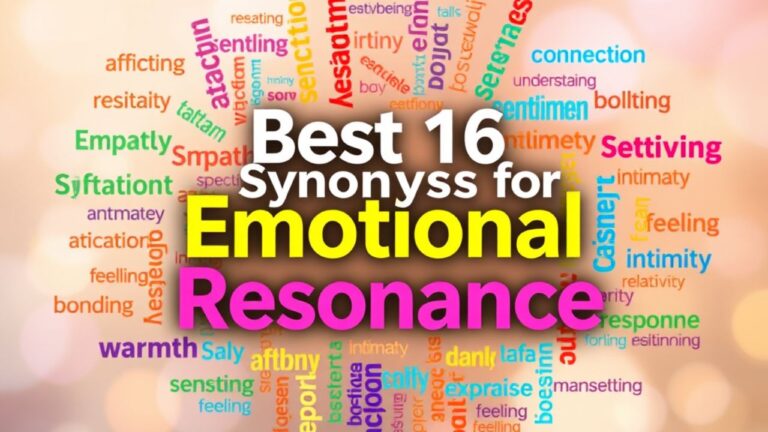When discussing emotional resonance, it’s important to consider various synonyms that convey similar deep feelings. One key term is empathy, which highlights the ability to deeply understand and share someone else’s emotions. Another is sympathy, often used when someone feels sorrow or pity for another’s situation.
Sentimentality involves a strong emotional attachment, typically to something that evokes memories. Affection captures a warm, tender feeling toward someone or something. Compassion emphasizes a deep sense of concern for others’ suffering. Additionally, sensitivity refers to being keenly aware of emotional cues.
These terms all highlight different aspects of emotional engagement and connection, offering a rich vocabulary for discussing human emotions.
What Did “Emotional Resonance” mean?
“Emotional resonance” refers to the ability of something—such as a piece of art, music, a story, or even a personal experience—to evoke strong, meaningful emotions in an individual. It describes how deeply something can connect with a person’s emotions, often leaving a lasting impression.
This resonance can occur when the content aligns with one’s personal experiences, beliefs, or feelings, creating a sense of understanding, empathy, or emotional response. Essentially, it’s when something emotionally “strikes a chord” with someone, stirring their inner feelings.
Synonyms
- Empathy
- Sympathy
- Sentimentality
- Affection
- Compassion
- Sensitivity
- Understanding
- Deep connection
- Emotional impact
- Heartfelt reaction
- Sentimental value
- Emotional depth
- Personal relevance
- Soulful connection
- Emotional engagement
- Psychological resonance
Empathy
Empathy refers to the ability to understand and share the feelings of another person. It involves putting yourself in someone else’s shoes and experiencing their emotions from their perspective.
Example: If a friend is grieving, empathy allows you to feel their pain and offer support without judgment.
Dear [Friend],
I understand what you’re going through, and I’m here to listen or simply sit with you if that helps. You’re not alone.
Warmly, [Your Name]
Sympathy
Sympathy involves feeling pity or sorrow for someone else’s misfortune, but it doesn’t always involve the deep emotional involvement that empathy does.
Example: When you hear about someone’s loss, you might express sympathy by sending a card or flowers.
Dear [Recipient],
I’m so sorry for your loss. Please know that my thoughts are with you during this difficult time.
Sincerely, [Your Name]
Sentimentality
Sentimentality refers to an emotional attachment to objects or experiences that evoke nostalgia or deep emotions.
Example: Watching old family videos might stir up sentimental feelings of warmth and nostalgia for your childhood.
Dear [Friend],
I found the old photo album from our trip last year, and it brought back so many wonderful memories.
Best, [Your Name]
Affection
Affection is a gentle feeling of fondness or love toward someone. It can be expressed through physical touch, words, or actions that show care.
Example: A mother hugging her child demonstrates affection, providing comfort and security.
Dear [Partner],
I just wanted to say how much I appreciate your love and affection. You mean the world to me.
Love, [Your Name]
Compassion
Compassion is the deep awareness of the suffering of others coupled with the desire to help alleviate that suffering.
Example: Volunteering at a shelter shows compassion as you work to support those in need.
Dear [Friend],
I admire your compassion toward those less fortunate, and I’d love to support you in your next charity event.
Warmly, [Your Name]
Sensitivity
Sensitivity involves being aware of and responsive to the emotions of others, often anticipating their needs or reactions.
Example: A sensitive person might notice when someone is upset and offer a comforting word or gesture.
Dear [Colleague],
I noticed you’ve been a bit quiet today, and I just wanted to check in to see if everything is okay.
Take care, [Your Name]
Understanding
Understanding is the ability to comprehend another person’s feelings, thoughts, or perspective, often leading to a supportive response.
Example: When someone is explaining their struggles, a display of understanding helps them feel validated and heard.
Dear [Friend],
I completely understand why you’re feeling this way, and I’m here for whatever you need.
Best, [Your Name]
Deep connection
A deep connection refers to a profound bond with someone, often characterized by mutual understanding and shared emotions.
Example: Close friends or romantic partners often share a deep connection that transcends superficial interactions.
Dear [Partner],
The connection we share feels so meaningful to me, and I cherish every moment we spend together.
Love, [Your Name]
Emotional impact
Emotional impact refers to the ability of an event, story, or experience to stir deep emotions, leaving a lasting impression.
Example: A powerful movie scene might evoke tears, showing the emotional impact it has on the viewer.
Dear [Friend],
That movie we watched together really stayed with me. The emotional impact was powerful.
Best, [Your Name]
Heartfelt reaction
A heartfelt reaction is a sincere, genuine response to something that deeply affects you.
Example: A heartfelt thank you after receiving a thoughtful gift demonstrates genuine appreciation.
Dear [Colleague],
Your kindness means so much to me. I’m truly touched by your heartfelt gesture.
Warm regards, [Your Name]
Sentimental value
Sentimental value refers to the emotional worth attached to an object or memory because of its personal significance.
Example: A childhood toy may have sentimental value, reminding you of a time when you felt safe and loved.
Dear [Friend],
That necklace you gave me holds so much sentimental value. I will cherish it always.
Love, [Your Name]
Emotional depth
Emotional depth is the capacity to experience, understand, and express a wide range of complex emotions.
Example: Someone with emotional depth might approach difficult situations with thoughtfulness, offering profound insights.
Dear [Friend],
I admire your emotional depth, and I always feel more enlightened after our conversations.
Warmly, [Your Name]
Personal relevance
Personal relevance refers to the way something connects with or is important to an individual based on their own life experiences.
Example: A person may feel deeply moved by a song that resonates with their own journey, giving it personal relevance.
Dear [Colleague],
That article you shared really resonated with me, as it mirrors some of my own experiences.
Best, [Your Name]
Soulful connection
A soulful connection refers to a deep, spiritual bond with another person that goes beyond the physical or intellectual.
Example: People who share a soulful connection often feel like they understand each other without needing words.
Dear [Partner],
I feel such a soulful connection between us, and it’s something truly special that I will always cherish.
Love, [Your Name]
Emotional engagement
Emotional engagement is the act of being fully involved in an emotional experience, whether in a relationship or an event.
Example: Attending a live concert and feeling emotionally engaged with the music is a powerful experience.
Dear [Friend],
I’m so emotionally engaged in this project, and I feel excited about what we’re creating together.
Warm regards, [Your Name]
Psychological resonance
Psychological resonance refers to the way certain experiences or ideas strike a chord with an individual on a mental or emotional level.
Example: A personal story shared in a book might create psychological resonance, causing the reader to reflect on their own experiences.
Dear [Colleague],
Your presentation really created psychological resonance for me. It made me think deeply about my own journey.
Sincerely, [Your Name]
Conclusion
Understanding the various synonyms for “emotional resonance” provides a deeper insight into the ways we connect with our emotions and others. From empathy to psychological resonance, each term highlights different facets of human emotion and the impact of shared experiences.
Whether it’s sympathy, compassion, or sentimental value, these emotional expressions enhance our relationships and help us navigate the complex emotional landscapes of life. By recognizing and embracing these diverse emotional connections, we can foster greater understanding and empathy in our interactions with others.

SEO specialist focused on enhancing website visibility, driving organic traffic, and optimizing user experience for better conversions.







